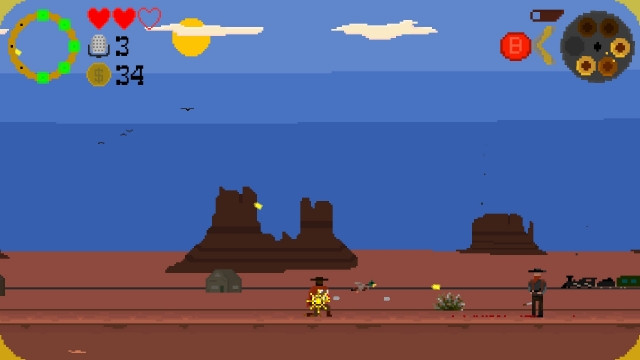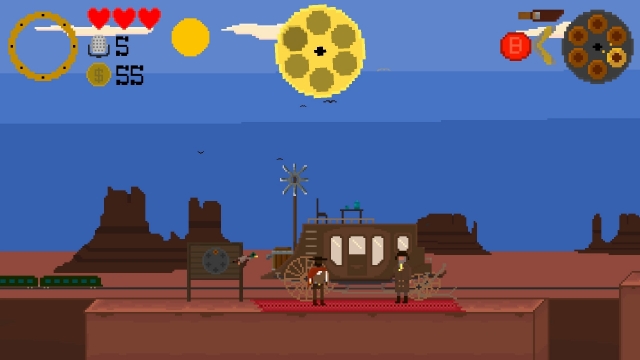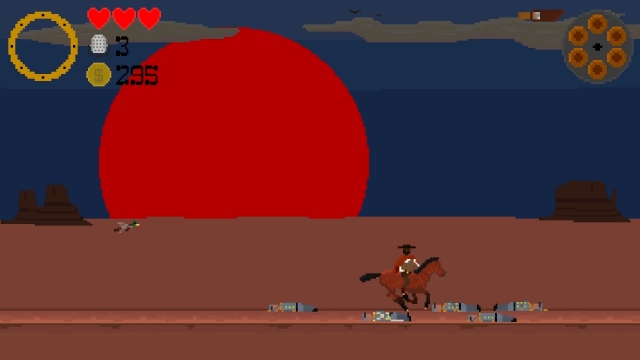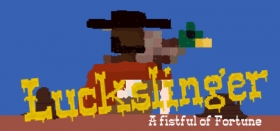
Luckslinger Review
I need a night of relaxation - stat. My brain is overcharged, my hands almost crippled and my frustration levels very close to expiry point. It’s been a long, long time since a game has left me mentally battered and bruised like Luckslinger. I’m accustomed to having to replay bits of games every so often, and thereby use that time to become better and better - but Luckslinger is savage. It’s cruel, frightening, and horrendously antagonising. It’s a side-scroller, by the way, with a savvy pixelated western theme. It’s your classic run and gun gameplay, but with a brilliantly unique twist - luck is a tangible gameplay factor.
How many times have you played a game and wondered if something, somewhere, is laughing at your failure, prodding the game into favouring everything but your success? Luck is a crucial part of videogaming, no matter the game or genre, so to see a developer explore the very concept of increasing or decreasing ‘lucky situations’ is fascinating. Sadly, although understandable, the way luck actually plays into the game is less fantastic than the lofty ideas you may have. You simply pick up little shiny balls of luck from vanquished foes; the more you gather, the luckier Luckslinger (the suave eponymous hero) will be.

In literal gameplay terms, being lucky means that enemy bullets will occasionally fly well off course, or if you fall down a hole (the game features plenty of platforming elements), a stray platform may appear and save you. There are a fair few ways luck can affect your game, and they tend to vary depending on the level. The gameplay that this is all affecting is largely familiar; your typical platform side-scrolling complete with varying enemies, special attacks and bullet dodging. It’s all well executed though, and the luck adds something different. It’s a neat idea, and certainly unique, but the way luck factors into the game’s outrageously terrible checkpoint system makes it all feel a little bit redundant.
Indeed, Luckslinger features the worst checkpoint mechanic that I’ve ever seen in a videogame. The game, in case you didn’t realise, is very hard. That’s fine in theory, but when the difficulty is caused largely by a daft respawn system, it’s difficult not to feel cheated and, yes, incredibly frustrated. When starting a level, the player is (initially) given just three lives and three attempts at the stage. Lose those three lives, and you lose one of your attempts and start from one of the checkpoints dotted through each level - that’s fair enough, and entirely sensible. If you manage to burn through those three attempts, however, you have to start the whole level from the very beginning.

It’s absolutely horrible. You could spend 20 minutes playing through a level only to lose all three of your attempts fighting the boss. You’re then booted to the start of the stage and forced to redo the entire 20 minutes of gameplay. In all likelihood you’ll lose an attempt or two during that 20 minutes, lose the rest to the boss, and have to start over AGAIN. Through this system, Luckslinger becomes a game of incredible tedium and repetition. An option to turn this system off, and just simply respawn from the nearest checkpoint, would be very much welcome. There are certainly players who won’t mind this issue, but for most it’ll simply be too annoying.
Which is a crying shame, because the rest of Luckslinger is absolutely inspired. While the luck element of the game is the most touted, it’s actually the game’s fantastic setting that makes it a cut above the rest. Set within the odd lovechild of spaghetti western and hip-hop vinyl, Luckslinger is as charming as it is rage-inducing. Each level features an entirely new setting, be it a dark, dirty mine or a high-speed train (admittedly a little less technically astounding than the Uncharted 2 equivalent), and these are punctuated by a western-style hub-world. Within that town you can buy upgrades, take on small but amusing challenges and engage with the local populace. They’re all rather barmy too, including a drunken sheriff, a rhyming preacher and even a couple of hardcore Luckslinger fans - a group that’s rather telling for the game at large.

Considering the musical motifs that are used throughout the game (checkpoints, for instance, are represented as new scratches on your ‘save game vinyl), it’s not surprising that Luckslinger has a fantastic soundtrack. Who knew that crossing hip-hop beats with atmospheric western music would make for such enjoyable music? Well, the Duckbridge team I suppose. Couple the sweet sounds with a perfectly complementary visual style and surprisingly humorous writing, and you’ve got a game that feels unlike any other. It’s only with indie games of this nature that you’ll find something with such a sense of personal touch. It’s clear that Luckslinger is a labour of love and incredible investment.
There really is a lot to love about this game. The problem is, the natural flow of the thing is completely disrupted by the near game-crippling checkpoint system. It’s amazing how one small mechanic can completely bust a whole game. You’ll spend a portion of your time in Luckslinger admiring the fantastic world, fun gameplay and lovingly crafted missions/hub. Yet for all of those great bits, you’ll spend the majority of your time replaying the same levels over, and over and over until you finally make a breakthrough. By that point, it’s not satisfying, it’s just relieving. It really is unfortunate that Duckbridge decided to place replayability through difficulty above simple, good ol’ fashioned enjoyment. The difficulty will, and should, scare off many players - and for those who stick around, it’s hard not to feel as though Luckslinger could be so much more fun if it would just follow its own chilled-out mantra.
Luckslinger (Reviewed on Windows)
Game is enjoyable, outweighing the issues there may be.
It really is unfortunate that Duckbridge decided to place replayability through difficulty above simple, good ol’ fashioned enjoyment. The difficulty will, and should, scare off many players - and for those who stick around, it’s hard not to feel as though Luckslinger could be so much more fun if it would just follow its own chilled-out mantra.











COMMENTS
Duckbridge - 03:25pm, 21st August 2015
Heyhey! Just wanted to say we added another difficulty setting for Luckslinger, and did some extra balancing. Now you can flip a switch to put the game on "new school" mode. In new school mode you can always restart at the latest checkpoint. We felt really sorry for the players that really wanted to see more of Luckslinger but couldn't because of the difficulty... So there you go! <3
Acelister - 04:00pm, 21st August 2015
Well, sounds like I'm going to be picking this up, then!
Funnily enough, we mentioned this game in the podcast last night. We were discussing pixel graphics. I may have remembered the score wrong...
http://www.gamegrin.com/articles/the-gamegrin-grincast-episode-13-pixel-art-is-lazy/